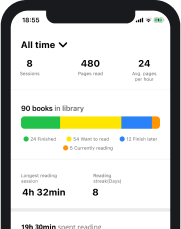As readers, we tend to face more challenges than we might expect nowadays. Our time is limited, to say the least, there are millions of things that constantly distract us from doing what we want, and we often miss out on what we actually love doing. While the way we live our lives is not exactly subject to change as there’s very little we can do to influence the things that affect us, we can learn to accept and work around them in a way that allows us to also focus on reading.
A particularly interesting phenomenon that affects us as readers is Tsundoku: the art of buying books and never reading them. Here at Basmo, we want you to have all the necessary information to become the best, perfectly-organized reader you can be. That is why we dedicated some time and effort to present to you Tsundoku and what you can do to not fall victim to this phenomenon.
What is Tsundoku?
The Tsundoku definition is a pretty straightforward concept: it represents the habit of buying books and never reading them.
It originates in 17th-century Japan, and the term is a combination of two Japanese words: tsunde – which means to stack things up, and doku which means reading.
So, how did a Japanese word for buying books and not reading them become an international phenomenon? The original Tsundoku meaning goes a little deeper than what we know it as today. In Japan, this term has been used for centuries and has deep roots in Japanese culture. It is believed that the reason for this is the fact that in Japan, back in the day, books were considered extremely valuable possessions which were collected and passed down from one generation to another as an inheritance.
Back then, books were commodities and it made sense for people to buy and store them when they could afford to, even if they had little or no intention of actually reading them. Buying books and not reading them was not necessarily seen as a bad habit but as a wise investment.
There is a distinct differentiation that needs to be made in order to better understand what Tsundoku stands for. At first glance, it may seem quite similar to bibliomania, but if we get into a little more detail, the differences become clear. Bibliomania is a condition that involves collecting books (sometimes with an obsessive-compulsive tendency) to the extent of it becoming a health hazard or having a negative effect on the person’s life and relationships.
Here comes the interesting difference. A bibliomaniac has no interest in actually reading the books, is perfectly happy with just owning them, and gets a sensation of comfort or pleasure from simply having them around. Tsundoku comes with the additional characteristic of making the person unhappy with the fact that they own books and have no time to actually read them.
So, while a bibliomaniac simply wants to own books, a person suffering from Tsundoku syndrome has a compulsive need to buy books but is also unhappy about not being able to read them all.
Is Tsundoku a good habit?
So, what’s the problem with buying more books than I can read? Well, it depends on how it affects your life and your reading habits. Buying and collecting books is not a bad habit in itself, but a Tsundoku problem can occur in certain scenarios.
One thing to remember is that times have changed since the term Tsundoku has been coined in Japanese culture. Nowadays, books are no longer commodities (unless you are a serious collector and you are always on the hunt for valuable books), and their true value doesn’t come from them as objects. Their true value is their content, the information you can gain from reading them, and the experiences you can live through thanks to them.
Tsundoku will therefore become a problem if you realize that you’re spending more money on books than time on reading them. As a rule of thumb, unless you are a collector who simply loves owning books, the whole point of purchasing books is taking advantage of their content and the experience they can provide. If you feel that you’re not reading enough and your TBR list keeps getting bigger and bigger, causing you frustration, then yes, Tsundoku is an issue for you and you will need to learn to overcome it.
Tsundoku can have a negative impact on the way you experience reading and how you perceive it as an activity. If you are constantly unhappy about the amount of reading you’re doing and you often associate this activity with a feeling of frustration, you are likely to develop a negative attitude towards reading.
At some point, you may start feeling overwhelmed by the number of books in your collection once the realization hits you that you are so far behind with your reading that it might take you years to actually finish reading all the books you own.
How to overcome Tsundoku?
Luckily, even though Tsundoku does come with a series of negative aspects, the good news is that it can not only be overcome but actually used to your advantage. Depending on what your ultimate goal is as a reader, there are several ways Tsundoku can be managed.
Here are some of the most common strategies for overcoming Tsundoku as soon as it becomes a problem.
1. Decide if it’s really a problem you need to handle
As I mentioned, Tsundoku doesn’t necessarily need to be a problem you need to solve. There are a lot of worse things that can happen in your life than surrounding yourself with books. Being excited about books and reading and constantly buying new novels to enjoy is hardly something you should need a cure for.
Here are some of the things that might indicate that you really do have an issue that you should look into:
- You’re spending on books more than you can afford
- You constantly feel stressed and overwhelmed by the fact that you own too many books you haven’t yet read
- Your loved ones complain about how much you spend on books
- You find yourself in a constant book clutter caused by new books being added to your collection faster than you can organize them
- You feel guilty about Tsundoku
- Your daily activities are somehow affected by your constant book purchases
Unless you tick at least some of the boxes on the checklist above, you have nothing to worry about. You’re simply a regular person who loves books but has no time to read. If you do feel like this is becoming a problem, it’s time to take some action.
2. Set a buying limit
Obviously, the quickest and safest way to decrease the pressure or the inconvenience of Tsundoku is to start looking at the way you do your purchases. From here, there are two distinct possibilities depending on what exactly is causing you distress. Are you more worried about the money you spend or about the space the books are taking up in your home?
If you’re worried about money, set a budget. Make it a rule that you are not allowed to spend more than a certain amount on books every month. You decide what the limit is and how much you can actually afford. One important thing to remember is that it is not necessary to cut book purchases completely out of your life. Just set limits you are comfortable with.
If space is an issue that is more pressing than money, you should limit the number of books you actually buy or look at alternative formats (e-books, audiobooks).
3. Be kinder to yourself
The secret about the ways Tsundoku can affect you is that you can manage it by simply adjusting your mindset toward it. Acceptance is key. Yes, you may have bought a lot of books and didn’t manage to read them. That is hardly a tragedy.
You need to learn to focus on the positive: you have plenty of books to read! If you educate yourself and figure out a way to stop buying books until you’ve managed to read what you already own, everything is going to be ok.
Being too hard on yourself only works against you. The more frustrated you get, the less you’ll read, your frustration will grow even more, and you will try to find your comfort in buying more books. This is a spiral you want to avoid at all costs.
4. Learn when to say no
We’re being taught that we need to finish every book we start reading. That is not necessarily a good mindset. Sometimes, deciding that a book is not worth reading is a lot better than powering through and reading something we hate. Reading is supposed to bring us joy and value. If it doesn’t, there’s no point in forcing ourselves to read books that are simply not worthy of our time.
5. Start selling or donating
In a similar way, sometimes it is a lot better to simply start selling or donating the books that are taking up too much space in our home. Rather than punishing yourself for your Tsundoku and constantly making plans to read them all knowing full well that your time won’t allow it, you can at least try and get some of your investment back or put out some positive energy in the universe by donating them.
6. Try the Marie Kondo method
Sometimes, Japanese problems require Japanese solutions. Your Tsundoku problems could be solved through the methods of Japanese organization guru Marie Kondo. The KonMari method is a powerful strategy for tidying up or decluttering your home and it works very well with books.
While there is clearly a lot more to it, the essence is that you should not keep anything that doesn’t bring you joy. Put all your books in a pile on the floor and start sorting them, take each one in your hand and think about it, does that particular book bring you joy? If it does, you keep it. If not, you toss it. You would be surprised to find out how efficient this process actually is.
7. Read more
I know, it’s easier said than done. But you should also know that having too little time to read is not exactly the real problem. With the right mindset and a set of tools to aid you in the process of setting healthy reading habits, you will be surprised to find out how much you can actually read if you set your mind to it.
After all, reading is a very versatile activity in terms of where and when you can do it. You can read while you drink your morning coffee, you can read during your commute to work, on your lunch break, while you travel, even while you work out, or before you fall asleep. The important thing is to have the proper motivation and the right tools to develop healthy reading habits. And with that, Basmo can help.
Our reading tracking app comes fully packed with features that were designed to help you become the best and most efficient reader you can become.
Basmo can help you create a reading schedule. One thing that always gets in our way when it comes to reading is the hectic lifestyle we all have. Add some structure to your reading habits by scheduling your reading sessions.
Basmo comes with a built-in scheduler that allows you to select the exact days of the week and different times for each day when you want to get some reading done. That way, you always have a clear overview of the times you can actually do some reading depending on your other routines.
Set reading goals. Sometimes, what we need in order to read more is a little motivation and a clear purpose. With Basmo, you can easily set realistic goals in terms of the amount of reading you’re doing. For example, you can set a certain number of minutes you want to dedicate to this activity every day. Another option is to decide how many books you want to read in a year. Regardless of your choice, Basmo is going to help you get there and is going to display your progress toward your goals in a comprehensive and motivating manner.
Create reading lists. With Basmo, you can create as many reading lists as you want. That way, you can organize your titles depending on how long they’ve sat on your nightstand pile, or how badly you truly want to read them. You can organize your books however you see fit, and the lists are easy to create and manage. This will surely add a nice structure to your reading.
Final thoughts on Tsundoku: the art of buying books and never reading them
Tsundoku can be a problem or it can be a way for you to surround yourself with books, pushing yourself to read more. Whether you want to reduce Tsundoku or not is up to you and the way it impacts your life. If you want solutions, Basmo is the ultimate tool in keeping your reading habits healthy.
Image by sentavio on Freepik







